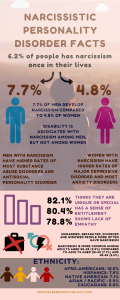Do I have narcissistic personality disorder traits?
Narcissistic personality disorder (NPD) symptoms are more common than one may think. Some of the NPD symptoms can be motivating [1], but also protective to one’s self-image [2]. Others, however, can be exploitative and manipulative [3],[4]. It is this confusing mix of adaptive and maladaptive traits that make it so difficult to identify someone with NPD. This narcissistic personality disorder test can be very useful to those who think they may have NPD and those who suspect someone of having NPD traits. This Narcissistic personality disorder test focuses on both the malignant and positive narcissism traits. Besides a total score, this narcissistic personality disorder test also provides scores on the categories: Entitlement Rage, Hiding the Self, Exploitative, Grandiose Fantasy, Self-Sacrificing Self-Enhancement, Devaluing, and Contingent Self-Esteem. The scores on these categories may help explain why you (or your friend) behave(s) the way you/they do. In general, the higher the score on the test, to more likely it is that someone meets the criteria for NPD, but this narcissistic personality disorder test cannot be used as a diagnostic tool. Please reach out to a professional in case you would like to be diagnosed properly.
Credits for this narcissistic personality disorder test are for the creators of the Pathological Narcissism Inventory (PNI): Aaron L. Pincus and colleagues.
The narcissistic personality disorder test takes approximately 13 minutes, is free, anonymous, and gives direct results and recommendations for future steps.
TO TAKE THE NARCISSISTIC PERSONALITY DISORDER TEST IMMEDIATELY, SCROLL DOWN
For more information:
- What is narcissism?
- NPD symptoms.
- How to live with a narcissistic person?
- How to deal with a narcissistic parent?
- Having a narcissistic mother-in-law.
- Having a narcissistic boss.
- Facts about narcissism.
- Online treatment for narcissism or guidance for those living with a narcissist.
- Take me to the homepage.
At Barends Psychology Practice, narcissistic personality disorder treatment is offered. Contact us to schedule a first, free of charge, appointment. (Depending on your health insurance, treatment may be reimbursed)
Narcissistic Personality Disorder Test
Literature used for this Narcissistic personality disorder test page:
- [1] Lukowitsky, M. R., Roberts, N. R., Lehner, A. N., Pincus, A. L., & Conroy, D. E. (2007). Differentiating forms of narcissism by achievement-related motives and interpersonal problems. In annual meeting of the Society for Interpersonal Theory and Research, Madison, WI.
- [2] Morf, C. C., & Rhodewalt, F. (2001). Unraveling the paradoxes of narcissism: A dynamic self-regulatory processing model. Psychological inquiry, 12, 177-196.
- [3] Pincus, A. L., Ansell, E. B., Pimentel, C. A., Cain, N. M., Wright, A. G., & Levy, K. N. (2009). Initial construction and validation of the Pathological Narcissism Inventory. Psychological assessment, 21, 365. Article about this narcissistic personality disorder test.
- [4] Watson, P. J., Varnell, S. P., & Morris, R. J. (1999). Self-reported narcissism and perfectionism: An ego-psychological perspective and the continuum hypothesis. Imagination, Cognition and Personality, 19, 59-69.


